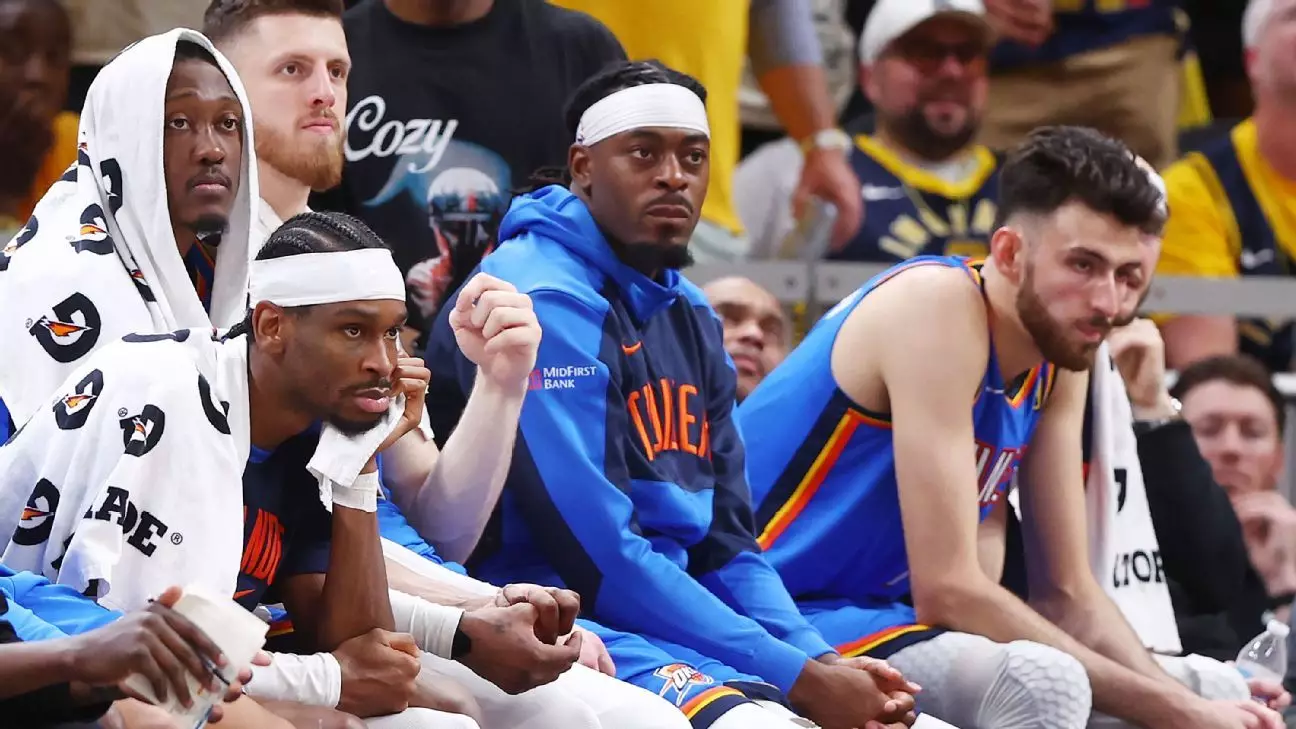In what was anticipated to be a watershed moment in the Oklahoma City Thunder’s pursuit of an elusive championship title, their performance in Game 6 against the Indiana Pacers was nothing short of a debacle. The outcome was a resounding 108-91 defeat, with Thunder star Shai Gilgeous-Alexander admitting bluntly, “We sucked tonight.” Such candid remarks underscore a deeper issue at play: the Thunder’s inability to manage pressure and maintain focus at a critical juncture in the finals.
As the stakes rose, so did the burden of expectation. The Thunder had a chance to crown themselves champions, not only for the season but as a historical milestone for the franchise. Instead, they were outmatched and demonstrated a curious lack of urgency and commitment. The defeat not only pushes the series to a decisive Game 7 but raises significant questions about the mindset of the team leading into what could be a defining moment in their history.
Lessons in Focus and Execution
Gilgeous-Alexander’s acknowledgments reflect a recognition of missed opportunities and shortcomings. With eight turnovers, he tied his personal playoff high, which reveals a staggering lapse in execution—an area that can often be the difference between champions and contenders. His frank assessment that the Thunder “were not where we needed to be on either end of the floor” resonates profoundly in a sport where focus can dictate the rhythm and flow of the game.
Moreover, the Thunder’s shooting statistics from Game 6 tell a disconcerting story. A mere 38.2% shooting accuracy combined with an abysmal 3-for-20 beyond the arc through three quarters paints a picture of stagnation. This is not merely a statistical failure but a stark reflection of a team that seemed to lose its essence and synergy when it was needed the most. Jalen Williams voiced a critical observation about their offensive flow, noting how a lack of trust in one another led to a “sticky” offense that fell prey to a rigid Pacers defense.
Defensive Woes and Team Dynamics
The Thunder’s inability to string together cohesive offensive plays was exacerbated by defensive issues that had little to do with the Pacers’ strategies. Coach Mark Daigneault characterized the performance as “collective” disappointment, indicating that it wasn’t merely the fault of individual players, but rather a complete breakdown of the team’s collective effort. This lack of cohesion is alarming, particularly in a playoff environment where teamwork and resilience are paramount.
Amidst the struggles, it is crucial to highlight that Oklahoma City players were acutely aware of the stakes. Gilgeous-Alexander admitted that the weight of the championship opportunity impacted their play—a psychological burden that can stifle performance. When a team is under such immense pressure, it can be all too easy to overthink plays or to become disjointed, as Williams implied.
Turning the Tide for Game 7
As they prepare for Game 7, the Thunder must confront their shortcomings head-on. The key lies in harnessing the lessons learned from this unraveling performance. For a young squad with ambitions of championship glory, this moment could serve as a pivotal learning experience. The Thunder must channel frustration into focus, allowing them to elevate their game when it matters most.
Resting their starters during the fourth quarter of Game 6 may provide an unexpected advantage to Oklahoma City; fresh legs can be crucial when facing the ultimate test. A mindset shift from pressure to opportunity is essential. The important queries remain: can they trust each other to make the right plays? Will they rise to the occasion and turn the energy of a potential last stand into a victorious finale?
This moment in time is not just about Basketball; it encapsulates the very essence of competition, resilience, and the indomitable human spirit to rise from setbacks. For the Thunder, success on Sunday hinges on their ability to learn from the past and step into the future with collective determination.

